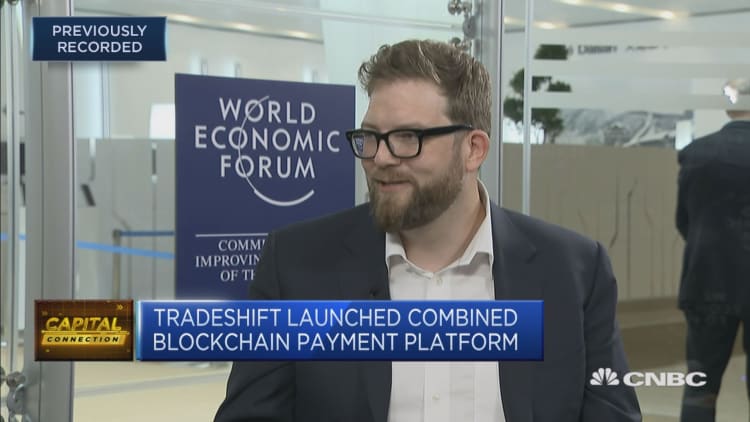
Blockchain technology is not yet mature enough to fully support the global supply chain, according to the CEO and co-founder of Tradeshift, a digital invoicing start-up.
Using blockchain is a great idea when there are multiple stakeholders involved since the ledger records every transaction that takes place, Christian Lanng told CNBC at the World Economic Forum in Tianjin, China on Wednesday.
Supply chains "often have many different stakeholders touching goods, moving them around," he said. "If you want to have authenticity, if you want to know where it is sourced, that it is done in a responsible way ... (blockchain) is a great technology to manage that kind of flow and be sure of the integrity."
"The problem is just it's not a high-performance technology," he said, adding that it is also expensive.
Tradeshift is a start-up in the supply chain payments and marketplaces space. The company helps other businesses send and pay invoices using software, instead of using traditional offline methods that are often costly and inefficient.
As of July, the company raised more than $400 million in funds and was valued at $1.1 billion.
One of the main problems is that existing supply chains were not built for change, according to Lanng. To solve the issue, companies need technologies that can digitize their supply chains so that they can respond to change quickly, he said.
Blockchain is one such technology that experts say could have the potential to shake up the global supply chain. But Lanng warned about the hype surrounding the technology.
"Whenever people say blockchain, I think what they're really saying is they would like to connect things digitally," he said. "I don't think blockchain is a mature enough technology yet to carry that ... I also want to be a little bit cautious for some of the hype."
Blockchain is still very new and its tangible benefits are more theoretical than practical. Bitcoin was the first major application of blockchain technology with a focus on payments.
Some experts have predicted that the earliest viable applications of the technology will likely be seen in supply chain management instead of the financial services industry, where many major banks are already carrying out experiments. The idea is that the blockchain can eliminate the need for third-party intermediaries that are often present in the supply chain, in turn cutting costs and increasing business efficiency.
While companies and governments across industries are exploring blockchain and its potential uses, surveys indicate that widespread adoption of the technology is still about five to ten years away.
Lanng pointed to Ethereum — a major decentralized platform that runs smart contracts that are built on the blockchain. He said it can do around seven transactions a second, which is slower than dial-up connection.
"When you run a global supply chain, you have (thousands) of transactions per second. So, I think for identity, I think for certifications and stuff like that, blockchain is useful," Lanng said, explaining that many of the potential use cases will take time to be proved.
"For the main transactional scenarios, it's not ready yet. It's too expensive and it's very complicated to build and scale," he added.
— CNBC's Evelyn Cheng contributed to this report.


